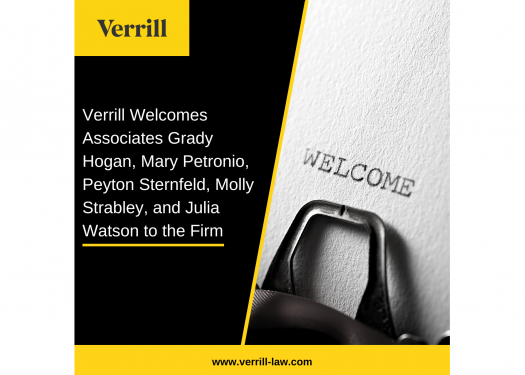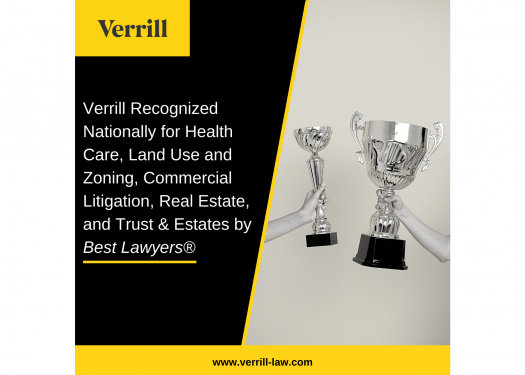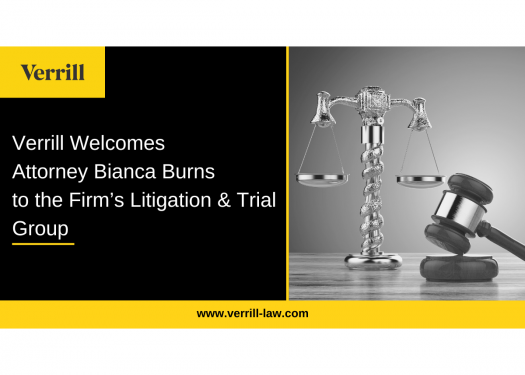Experience
Verrill Attorneys Secure Landmark Victory in Anti-SLAPP Defense Against Business Competitors
Verrill attorneys were victorious in defending against a special motion to dismiss filed by business competitors in a case with claims for unfair and deceptive business practices and abuse of process. Bristol Asphalt Co., Inc. v. Rochester Bituminous Products, Inc., 493 Mass. 539 (2024). The SJC used the case to clarify and simplify the legal framework that Massachusetts Courts use for evaluating a special motion to dismiss filed under the Anti-SLAPP Statute. The SJC has been focused on refining this standard for several decades and has successfully provided clear guidance on the analysis required by the Anti-SLAPP Statute for reviewing a special motion to dismiss.
Successful Representation of Insurer before U.S. District Court for the District of Maine
Verrill successfully represented an insurer before the U.S. District Court for the District of Maine in an insurance coverage matter alleging that the insurer improperly denied a defense and indemnification to a landlord under a homeowner’s policy. The landlord was sued for invading his tenant’s privacy. The District Court entered summary judgment for the insurer. The Court determined that the landlord’s actions and the tenant’s ensuing emotional distress were not an “accident” giving rise to a covered “occurrence” under the policy. In addition, the insured’s conduct fell within the policy’s exclusion for injuries “intended or reasonably expected” by the insured. In so holding, the District Court rejected plaintiff’s argument the landlord never intended for the tenant to be harmed by his conduct because he never expected that the tenant would discover the invasion of privacy. The Court concluded, based on the facts alleged in the underlying complaint, that the landlord “either actually intended or should have reasonably expected” that his conduct would cause harm to the tenant. The Court ultimately determined that the insurer had neither a duty to defend nor a duty to indemnify the insured.
Niles v. Travelers Home and Marine Ins. Co., 2:21-cv-265 (D. Maine)
Elections and Constitutional Law: Successfully Challenged Certification of Initiative Petition
In a victory for consumers and the ride-hailing public, the Massachusetts Supreme Judicial Court recently barred the Secretary of State from placing on the November ballot initiative petitions proposed by companies such as Uber, Lyft, and Doordash that sought to insulate them from liability for automobile accidents and other wrongs committed by their drivers. The consumers were represented by Thomas Bean and Sarah Grossnickle from Verrill Dana LLP and M. Patrick Moore from Hemenway & Barnes LLP.
The Court held that the initiative petitions did not meet the requirement in Article 48 of the Massachusetts Constitution that ballot questions to include only subjects “which are related or which are mutually dependent.” The Court held that the petitions failed the “related subjects” requirement because they contained “at least two substantively distinct policy decisions.” The initiative petitions sought to classify drivers for rideshare and delivery companies as independent contractors and provide certain minimum compensation and benefits. But “buried in obscure language at the end of the petitions” were provisions that also narrowed the scope of tort recovery for third parties, including those who may have been injured in traffic accidents caused by the negligence of app-based drivers, or even sexually assaulted by them.
The Court noted that voters may “strongly approve of better wages and benefits for drivers struggling to make ends meet in the gig economy, but at the same time strongly oppose limiting their own rights to recover money damages from network companies if the tortious actions of drivers who provide services through those companies’ platforms cause them injury.” The Court concluded, “[p]etitions that bury separate policy decisions in obscure language heighten concerns that voters will be confused, misled, and deprived of a meaningful choice -- the very concerns that underlie art. 48's related subjects requirement.”
The decision is El Koussa v. Attorney General, Mass., No. SJC-13237.
Notable Experience
- Argued and won case at the Supreme Judicial Court regarding the extension of deadlines under the Wetlands Protection Act and establishing standard of review for Enforcement Orders.
- Handled and won multiple cases at the Appeals Court including case in which the Appeals Court upheld a tuition award against a student who did not have residency in the district while attending the public school and a case in which the Appeals Court upheld the zoning decision of a local board.
Patent Litigation: Mesenchymal Stem Cells
Represented small biotech company and two academic researchers against large pharmaceutical company in dispute over inventorship of several patents relating to mesenchymal stem cells and their uses, as well as defending against numerous state law claims regarding alleged improper use of information; co-lead counsel; responsible for damages experts and substantial responsibility for state law claims; examined (and cross examined) multiple witnesses in one of the first Zoom bench trials in Massachusetts; prevailed on all state law claims, including a finding that defendants were not entitled to any monetary compensation.
Patent Litigation: Semiconductors
Represented semiconductor manufacturer in patent case against competitor in litigation in U.S. District Court for the District of Delaware, in which both sides asserted patents relating to power management and A-D converters; conducted Markman hearing and obtained favorable construction, leading to the case being settled on favorable terms shortly after fact discovery began.
Patent Litigation: NPEs
Represented many companies over the years in patent litigations brought by numerous non-practicing entities, including in U.S. District Courts for the Eastern District of Texas, District of Delaware and Northern District of California; aggressively pursued early motions and uncovered key prior art that led to favorable settlements for his clients.
Patent & Trade Secret Litigation: IT Infrastructure Software
Represented large provider of IT management solutions in lawsuits in U.S. District Courts for the Eastern District of New York and the Northern District of California against competitor alleging infringement of patents relating to object code instrumentation and misappropriation of trade secrets; took the lead in discovery matters, argued several Daubert motions in court and participated in successful settlement negotiations of all matters shortly before trial.
Patent Litigation: MEMS Microphones
Represented large semiconductor manufacturer in an ITC investigation and parallel district court proceeding in U.S. District Court for the Northern District of Illinois, defending against two patents owned by a competitor relating to microelectromechanical systems (MEMS) microphones; instrumental in prevailing in a rare initial determination proceeding (akin to a preliminary injunction hearing), in which an administrative law judge found the competitor's patents were invalid, and then in proving invalidity at full merits hearing; ITC affirmed both invalidity determinations.
Patent Litigation: Telecommunications
Defended large telecommunication company in patent litigation in U.S. District Court for the Northern District of Texas brought by a competitor over eight patents relating to encryption, unified communications, messaging, and audio and video codecs; filed four petitions for Inter Partes Review with the Patent Office, and obtained institution on all of them; case settled favorably shortly thereafter.
Patent Litigation: Golf Balls
Represented large golf equipment manufacturer in case in U.S. District Court for the District of Massachusetts against numerous golf ball sellers over patents relating to aerodynamics of golf balls; defeated a motion to dismiss and obtained favorable settlements with all defendants early in proceedings.
Patent Litigation: Chemicals
Defended chemical company in patent case involving patents related to termites and animal health, and was heavily involved in expert reports and discovery, as well as Markman and summary judgment motions; obtained favorable claim construction ruling and filed strong summary judgment motion of invalidity, leading to the case being settled hours before argument on summary judgment motion.
Patent Litigation: Golf Clubs
Defended large golf equipment manufacturer against competitor who alleged that several golf clubs infringed a patent; obtained summary judgment of non-infringement for all golf clubs and claims from U.S. District Court for the Eastern District of New York, defended decision on appeal to the U.S. Court of Appeals for the Federal Circuit, and obtained second summary judgment of non-infringement after initial decision was partially vacated on appeal.
Patent Litigation: Medical Device
Defended company medical device manufacturer against claimed infringement of expired patent relating to laser hair removal; obtained stay of matter pending reexamination of patent, which resulted in cancelling of all allegedly infringing claims and dismissal of case against client.
Patent Litigation: Speech to Text Software
Represented company that developed speech-to-text software in action against large software company for patent infringement; successfully transferred case from E.D. Tex. to D. Mass; obtained favorable claim construction ruling; and matter settled after business resolution between the parties.
Patent Litigation: Telecommunications
Defended three major telecommunications companies against patent claims relating to VoIP technology in U.S. District Court for the Eastern District of Texas; took lead in preparing pretrial filings and assisted with trial witness preparation; case was settled after the third day of trial for a fraction of the original demand.
Patent Litigation: Video Monitoring Software
Represented company that provides intelligent video monitoring products who sued larger competitor for infringement of patent related to video monitoring and for theft of trade secrets in U.S. District Court for the Central District of California; case settled favorably during fact discovery after Mr. Stern took key deposition of engineering employee of defendant.
Patent Litigation: VoIP
Defended three telecommunications networking companies in E.D. Tex. against accusation of infringement of patents relating to VoIP technology; lead responsibility for witness who testified at trial about key prior art; case settled the next day for a fraction of the original demand.
Copyright Litigation: Software
Defended large manufacturer and reseller of telecommunications equipment against copyright infringement, breach of contract and misappropriation of trade secret claims involving Simple Network Management Protocol (SNMP) in numerous cases filed in U.S. District Court for the District of Delaware and U.S. Bankruptcy Court for the District of Delaware; was responsible for the day-to-day conduct of all cases, took and defended numerous fact and expert depositions, and was instrumental in filing summary judgment and Daubert motions, as well as numerous other pretrial motions; all cases were settled within days of trial of lead case.
Trade Secret & Unfair Competition Litigation: Healthcare
Defended national healthcare consulting firm on misappropriation of trade secrets and contract claims brought by competitor in Texas state court; defended against preliminary injunction, argued numerous discovery and pretrial; settled weeks before trial.
Trade Secret & Unfair Competition Litigation: Telecommunications
Represented large international manufacturer and seller of telecommunications equipment to all major wireless providers against a supplier in a breach of contract, theft of trade secrets and unfair competition action brought in the Commercial Division of the New York State Supreme Court, a case in which the plaintiff brought two separate preliminary injunction motions to stop our client from selling key hardware and software that is instrumental in sending data over Code-Division Multiple Access (CDMA) wireless networks; the case was settled favorably during a hearing on second preliminary injunction when it became clear that plaintiffs motion was unlikely to succeed.
Trademark Litigation: Multimedia
Defended multi-platform media company in trademark infringement and unfair competition matter in U.S. District Court for the District of Massachusetts; integral member of trial team; obtained complete defense verdict after bench trial.
Fletch's Sandblasting & Painting, Inc. v. Fay, Spofford and Thorndike d/b/a Stantec Consulting Services, Inc.
Filed successful motion to dismiss a design malpractice claim arising out of alleged defective specifications on a renovation project at the Portsmouth Naval Shipyard in Kittery, Maine. The court’s decision may be found at 2019 WL 847731 (D. Me. Feb. 21, 2019).
Defense of Contractor - Davis-Bacon Prevailing Wage Claims
This case concerned the construction of a marine boat dock on an island in Boston Harbor. The Plaintiff claimed entitlement to unpaid wages and enhanced wages under the federal prevailing wage statute known as the Davis Bacon Act. The Plaintiff sought treble damages and legal fees.
Under the Davis Bacon Act construction workers on federally funded projects must be paid specified wage rates (classified according to each trade and the locale of the project) for time spent on the job site. In this case the Plaintiff argued he was not paid for time spent on the "site of the work" as defined in the statute. He also took the position that since the work of constructing the dock was performed from a barge, workers should be compensated at the federal Davis Bacon rates while the barge was en route to the island where the boat dock was being constructed, in addition to the time spend there with the barge anchored while it served as the work platform. The travel on the barge each day was about 3 hours for a round trip.
There were contested facts as to whether and when the Plaintiff was actually on the work site. There was a legal issue regarding the definition of the "site of the work" whether the mobile barge was the "site of the work" while in transit to the island. If the Plaintiff prevailed on any of his claims it would have opened the door to claims from other construction workers on this same project to file similar suits.
The case was tried before a Maine Superior Court Justice in June 2013. The Court issued a decision in August 2013 finding in favor of our client on all claims.
Successful Design and Construction Defects Claims for Large Hospital Client
We are successfully pursued claims in federal court seeking recovery of damages arising from defects in the design and construction of a $170 million addition to a Maine hospital complex. The case involved building envelope and mechanic design and construction defects. The matter was resolved prior to trial to a successful outcome.
Jury verdict awarding our client in excess of $900,000+ in U.S. District Court on behalf of a wrongfully terminated general contractor
Our client was the prime contractor for construction of a new clay lined landfill in rural Vermont. The Owner terminated the contractor shortly before substantial completion and filed suit for completion costs. We countersued for wrongful termination and breach of contract. We pursued damages for lost profits on the project, termination costs, and delay damages. The jury found in our client's favor following a three week trial in Burlington. The jury award approximately 90% of the damages claimed for a total of $923,000. [J.A. McDonald v. WSI Moretown Landfill, Inc.]
- Arbitration award of a differing site conditions and delay claim which earned headlines in newspapers for a "KO" of the adverse party.
Contractor Prevails at Trial on Breach of Contract Claims and Gets Legal Fees Awarded
Our contractor/real estate developer client was sued in New Hampshire state court by the owner for breach of a of a $2 million design/build contract. Our client also asserted a counterclaim for breach of contract claim. Each party asserted claims for breach of the implied duty of good faith and fair dealing Following a three-day trial, the Court ruled in our client's favor for $395,000 and legal fees of approximately $91,000 stemming from the plaintiff's bad faith conduct. The matter is currently on appeal to the New Hampshire Supreme Court. [Rudyak et al v. Bearfoot Creek, LLC and Cheboygan Properties, LLC, Carroll County, NH Superior Court, Docket No. 212-2016,CV-00002]
Successful Defense of Claims for Delays, Owner Interference and Extra Work
The Jackson Laboratory, a global leader in genetic research, retained us to assist it with claims arising from construction of its $70 million state-of the art vivarium facility including late completion by its construction manager (CM). The CM alleged that our client interfered with its work by dictating means and methods of construction and sought compensation for project delays and extra work attributed to alleged defects in the plans and specifications put forward by our client's architect and engineers. We took an aggressive approach by filing suit in federal court shortly after completion of the project tackling head on the weak technical arguments put forward by the contractor for its claims for additional compensation. Our approached focus on contractor caused delays and inattention to means and methods of construction. This strategy resulted in an early mediation with a very favorable outcome for our client with a global resolution of the dispute achieved within six months of substantial completion.
Age Discrimination Case in the Health Care Industry
Verrill Dana's Litigation Team successfully represented a healthcare institution in an age discrimination case brought by a former doctor. The case wound its way from Federal Court, to Maine Superior Court to the Maine Supreme Court. The doctor argued that the reasons for his termination were pretextual and that he had been defamed during proceedings that resulted in his termination. The Federal Court dismissed the doctor's federal claims and the Superior Court granted summary judgment on the doctor's state law claims. The Supreme Court affirmed the Superior Court's grant of summary judgment, rejecting the plaintiff's novel procedural arguments.














